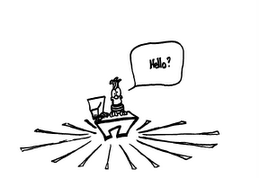I admit that this blog will be slightly different (and much longer) than usual. Another note for my regular younger readers, this blog might it be more appreciated by people who would have accessed this webbie from the MMSA (Malta Medical Student Association) website. ;) But, don't let this discourage you to keep reading on. In the meantime, I’d like to thank the person(s) involved for this recent and invaluable source of exposure.
This Monday, there was much discussion among my colleagues regarding how the exodus of junior doctors is, and could further, negatively affect the national health care service. The local press happened to have made "a bit of noise" about the matter in last Sunday’s papers. This explains our hustle on our way to CCU at 8:45 in the morning, and also while waiting for Dr. R. Xuereb, who never turned up to tutor us through the ward round.
The fact that “scarce resources are bleeding away” has been the subject of much debate more than once. I used to listen to Dr. Martin Balzan’s claims of Malta losing more than 50% its doctors (on Bondi+ for example) with much scepticism. So, hearing my friends cite valuable literature resources on the subject caught my interest a great deal.
MaltaToday stated that the majority of final year Medical Students are studying with the hope of doing their housemanship abroad. Alas, I didn’t manage to get my hands on a copy of that juicy piece of news. But, another article on today’s paper of The Times has conveniently extrapolated some of the information printed (for those who are still waiting for the MaltaToday website to be updated with last Sunday’s news). Relevant figures were used as a good introduction to help Lino Spiteri vommit his bile on the poor remuneration doctors are receiving in the public health sector:
This Monday, there was much discussion among my colleagues regarding how the exodus of junior doctors is, and could further, negatively affect the national health care service. The local press happened to have made "a bit of noise" about the matter in last Sunday’s papers. This explains our hustle on our way to CCU at 8:45 in the morning, and also while waiting for Dr. R. Xuereb, who never turned up to tutor us through the ward round.
The fact that “scarce resources are bleeding away” has been the subject of much debate more than once. I used to listen to Dr. Martin Balzan’s claims of Malta losing more than 50% its doctors (on Bondi+ for example) with much scepticism. So, hearing my friends cite valuable literature resources on the subject caught my interest a great deal.
MaltaToday stated that the majority of final year Medical Students are studying with the hope of doing their housemanship abroad. Alas, I didn’t manage to get my hands on a copy of that juicy piece of news. But, another article on today’s paper of The Times has conveniently extrapolated some of the information printed (for those who are still waiting for the MaltaToday website to be updated with last Sunday’s news). Relevant figures were used as a good introduction to help Lino Spiteri vommit his bile on the poor remuneration doctors are receiving in the public health sector:
“Malta's most abundant resources are becoming rather scarce where it matters most. That is what the growing threat of an exodus abroad from the medical profession is telling. There are many Maltese doctors working abroad. And, as reported by MaltaToday on Sunday, some 35 more would like to join them soon.”
The reasons why this is happening is pretty obvious, especially to people who spend a good part of their day at St. Luke's hospital. Doctors complain of finding it hard to cope with a growing demand for their services, hours-long queues, and patient waiting lists. Working conditions are poor, the pay is low, workloads are heavy, and there's little opportunity for career advancement (an understandable excuse so as not to make everything sound like "it's all about the money").
That same Sunday also saw one of the letters to the editor on The Sunday Times titled “Doctors’ condition at A&E”. This letter drew attention to the fact that the A&E is suffering as a consequence of the loss of its resources, particularly expertise staff, “to other specialities or overseas where working conditions and salaries are better”.
All these ‘reverberations’ in the local press seem to support the MAM in fearing a brain drain among doctors - a brain drain that will severely affect the country, despite these views being belittled by the government. A spokesman for the Health Division said on The Times in March 2005, “that although the possibility of a brain drain does exist, this was not likely to be imminent”. Dr. Deguara sees this phenomenon of doctors leaving the country as the inevitable consequence of us being a small island. Due to its size, Malta limits newly graduates from expanding their medical knowledge, whatever the area of specialty chosen.
“However, it will still be necessary for doctors to go overseas for training as the small size of our population does not offer the necessary breadth to achieve specialisation.”This doesn’t seem to be bothering the minister so much; at least not as much as the MAM. After all, the number of medical students keep increasing every year. The past 10 years (1995 – 2005) has seen a net increase of 162 doctors in St. Luke’s hospital, despite 50% of doctors have left the country (many of who express absolutely no wish to come back home). Also, the fact that the course opens annually without a numerus clausus since 2001 means that the number of graduate doctors can only keep increasing.
“Doctors who are leaving the island are almost all junior doctors going abroad for specialist training,”
And as the Ministry of Health assures the public of the unlikelihood of us experiencing a sever shortage of doctors (as in the 1970s), Dr. Mary Rose Cassar tries to entice current 3rd year medical students to specialise in Emergency Medicine due to the present staff shortage. As Dr. Deguara counts his blessings, the letter written by Dr Mario Tabone-Vassallo (president of the Association of Emergency Physicians of Malta) reminds everyone that a loss in the quality of adequately trained medics is still at stake. "But isn’t Malta known for it’s superb undergraduate training?", one may ask. Well, we certainly have that reputation (although the medical student of today wonders how the medical student of yesterday made it through the disorganised education system). However, we medics are always told that we never stop learning…that “the day we stop learning is the day we stop practising” (Prof. Josanne Vassallo). Medicine remains an apprenticeship; a skill which muct be attained and not only taught, which my justify the statement below written in the above cited letter to the editor:
“A&E is not the place for junior or inexperienced doctors, because this imperils patient care, quite apart from contributing to delays in the department and risk stressing other physicians.”
But life is a stage full of ironies. With all this talk about Malta potentially suffering from a medical brain drain, one might be surprised to see the real reasons why one of the two urology wards and a paediatrics ward at Mater Dei, together with 13 operating theatres, will not open when the migration process from St Luke's Hospital is completed.
“When contacted yesterday, the president of the Malta Union of Midwives and Nurses, Paul Pace said a shortage of nurses was the reason why new services and extra operating theatres would not be able to function upon migration.”
Bibliography
The Times Some wards, theatres will remain closed Wednesday 24th October 2007
The Times Scarce Resources Bleeding Away Wednesday 24th October 2007
The Sunday Times Doctors’ Conditions at A&E Sunday 21st October 2007
The Malta Independent Half of graduate doctors leave to work abroad – MAM study Sunday, March 25, 2007
The Times Fears of brain drain among doctors 6th March 2005




No comments:
Post a Comment